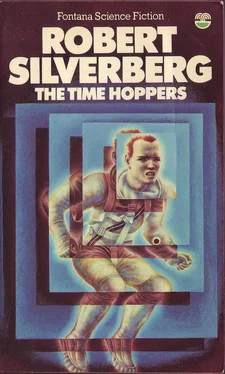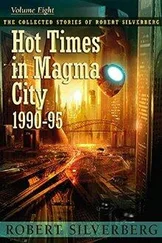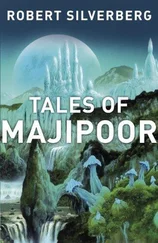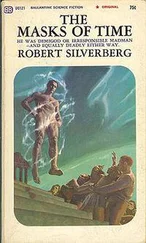The Time Hoppers
by Robert Silverberg
One can conceive of Heaven having a Telephone Directory,-but it would have to be gigantic, for it would include the Proper Name and address of every electron in the universe. But Hell could not have one, for in Hell, as in prison and the army, its inhabitants are identified not by name but by number. They do not have numbers, they are numbers.
—W. H. Auden,
Infernal Science
That Time should be a length travelled over is, all said and done, a rather elaborate conception; yet that this is the way we do habitually think of Time is agreed to by everyone, both educated and—which is much more curious—uneducated. … How did we arrive at this remarkable piece of knowledge?
—J. W. Dunne,
An Experiment with Time
For Michael Moorcock
There was a beauty in the crowded world, so they said. The crystalline city towers in serried ranks assembled, the patterned rhythms of a surging mob at a quickboat ramp, the dance of sunlight on a million iridescent tunics in one of the great plazas—in such things, the aesthetes said, was the abode of beauty.
Quellen was no aesthete. He was a minor bureaucrat, a humble civil servant of decent intelligence and normal proclivities. He looked at the world as it presented itself in A D 2490, and found it hellish. Quellen was unable to perform the intricate inner dance by which hideous overcrowding could be written off as modem beauty. He hated it. If he had been Class One or even Class Two, Quellen might have been in a better position to appreciate the new aesthetics, because he would not have been required to live right in the middle of them. But Quellen was Class Seven. The world does not look quite the same to a man in Class Seven as it does to a man in Class Two.
And yet, all things considered, Quellen was not too badly off. He had his comforts. Illegal comforts, true, obtained by bribery and cajolery. Strictly speaking, what Quellen had done was shameful, for he had taken possession of that to which he was not entitled. He had pocketed a private corner of the world, just as though he were a member of the High Government—that is to say, Class One or Class Two. Since Quellen had none of the responsibilities of the High Government, he deserved none of the privileges.
He had taken those privileges though. It was wrong, criminal, a betrayal of integrity. But a man is entitled to a fatal flaw of character somewhere. Like everyone else, Quellen had begun with high dreams of rectitude. Like nearly everyone else, he had learned to abandon them.
Pong.
That was the warning bell. Someone wanted him, back in the miserable warrens of Appalachia. Quellen left the bell alone. He was in a tranquil mood, and he didn’t care to puncture it simply to answer the bell.
Pong. Pong. Pong.
It was not an insistent sound, merely an obtrusive one, low and mellow, the sound of a bronze dish struck with a felt-covered hammer. Quellen, ignoring the sound, continued to rock uneasily back and forth in his pneumochair, watching the sleepy crocodiles paddling gently through the murky waters of the stream that ran below his porch. Pong. Pong. After a while the bell stopped ringing. He sat there, joyously passive, sensing about him the warm smell of green growing things and the buzzing insect noises in the air.
That was the only part of Eden that Quellen did not like, the constant hum of the ugly insects that whizzed through the calm, muggy air. In a way they represented an invasion; they were symbols to him of the life he had led before moving up to Class Seven. The noise in the air then had been the steady buzz of people, people swarming around in a vast hive of a city, and Quellen detested that. There were no real insects in Appalachia, of course. Merely that symbolic buzz.
He stood and walked to the rail, looking out over the water. He was a man just short of middle years and just above middle height, leaner than he once had been, with unruly brown hair, a wide, sweat-flecked forehead, and mild eyes of a shade not quite green and not quite blue. His lips were thin and tautly compressed, giving him a look of determination instantly belied by a less than affirmative chin.
Idly he flipped a stone into the water. “Get it!” he called, as two crocs glided noiselessly towards the disturbance in hopes of nabbing a fat gobbet of meat. But the stone sank, sending up black bubbles, and the crocs bumped their pointed noses lightly together and drifted apart. Quellen smiled.
It was a good life here at the heart of darkness, here in tropical Africa. Insects and all, black mud and all, humid solitude and all. Even the fear of discovery was supportable.
Quellen rehearsed the catalogue of his blessings, Marok, he thought? No Marok here. No Koll, no Spanner, no Brogg, no Leeward. None of them. But especially no Marok. I miss him the least.
What a relief it was to be able to stay out here and not suffer their buzzing voices, not shudder when they burst into his office! Of course, it was wanton and immoral of him to set up shop as an übermensch this way, a modem Raskolnikov transcending all laws. Quellen admitted that. Yet, he often told himself, life’s journey was a trip he’d take only once, and at the end what would matter but that he had travelled First Class pan of the way?
This was the only freedom, out here.
And being far from Marok, the hated room-mate, was best of all. No more to worry over his piles of undone dishes, his heaps of books scattered all over the tiny room they shared, his dry, deep voice endlessly talking on the visiphone when Quellen was trying to concentrate.
No. No Marok here.
But yet, Quellen thought sadly, yet, the peace he had anticipated when he built his new home had somehow not materialized. That was the way of the world: satisfaction draining off into nowhere at the moment of attainment. For years he had waited with remarkable patience for the day he reached Class Seven and was entitled to live alone. That day had come; but it had not been enough. So he had purloined Africa for himself. And now that he had encompassed even that, life was simply one uneasy fear after another.
Restlessly, he shied another stone into the water.
Pong.
As he watched the concentric circles of ripples fanning out on the dark surface of the stream, Quellen became conscious again of the warning bell ringing again at the other end of the house. Pong. Pong. Pong. The uneasiness within him turned to sullen foreboding. He eased himself out of his chair and headed hurriedly towards the phone. Pong.
Quellen switched it on, leaving the vision off. It hadn’t been easy to arrange things so that any calls coming to his home, back in Appalachia half a world away, were automatically relayed to him here.
“Quellen,” he said, eyeing the grey blank screen.
“Koll speaking,” came the crackling reply. “Couldn’t reach you before. Why don’t you turn on your visi, Quellen?”
“It’s not working,” Quellen said. He hoped sharp-nosed Koll, his immediate superior at the Secretariat of Crime, would not smell the lie in his voice.
“Get over here quickly, will you, Quellen? Spanner and I have something urgent to take up with you. Got it, Quellen? Urgent. It’s a High Government matter. They’re treading us hard.”
“Yes, sir. Anything else, sir?”
“No. We’ll fill in the details for you when you get here. Which will be at once.” Koll decisively snapped the contact.
Quellen stared at the blank screen for a while, chewing at his lip. Terror clawed his soul. Was this it, the summons to headquarters to discuss his highly illegal, criminally selfish hideaway? Had the downfall come at last? No. No. They couldn’t have found out. It was impossible. He had everything squared.
Читать дальше












